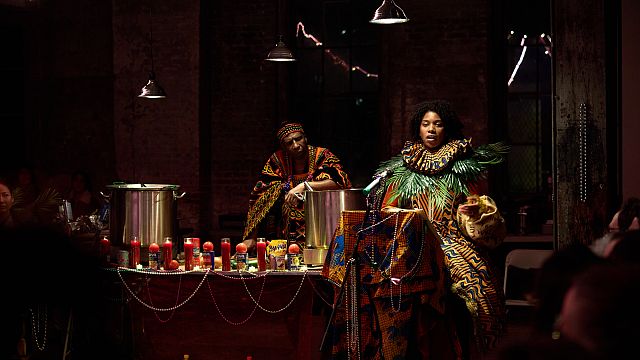**Introduction:**
In the heart of the Festival Confit de Cavaillon in southern France, amidst the tantalizing aromas and vibrant colors, a unique performance unfolds, transcending the boundaries of culinary artistry. “Autophagies,” a production by director Eva Doumbia, is not merely a culinary spectacle but a profound exploration of memory, history, and identity interwoven with the rich tapestry of migration, colonial legacies, dance, music, and the essence of African cuisine. As the audience is enveloped in a sensory journey, they are confronted with thought-provoking questions about the origins of our food, the narratives it carries, and the shadows of colonization that linger within each dish.
**Background Context:**
Against the backdrop of a world increasingly interconnected by trade, the fusion of cultures through food has become a powerful lens through which to examine the complexities of our shared history. The narrative woven by “Autophagies” delves deep into the intricate web of globalization, shedding light on the intertwined threads of exploitation, resilience, and cultural exchange that have shaped our culinary landscape. Eva Doumbia’s visionary approach challenges the audience to confront uncomfortable truths while celebrating the resilience and creativity of communities that have navigated the turbulent waters of colonialism and migration.
**Main Story Details:**
The stage is set ablaze with the rhythmic beats of a mafé simmering in a cauldron, filling the air with a tantalizing blend of sweet and earthy aromas. However, beyond the culinary spectacle lies a profound political undercurrent that underscores the performance. Eva Doumbia’s poignant exploration of the impact of colonization on food resonates deeply as she peels back the layers of history to reveal the often violent stories hidden within our favorite dishes. Through the expressive medium of dance, Bamoussa Diomande breathes life into the narrative, his movements a testament to the resilience and vitality of cultures that have endured the ravages of exploitation and displacement.
**Expert Analysis:**
According to Eva Doumbia, “Autophagies” serves as a critique of the devastating legacy of colonization, drawing attention to the complex relationship between food and power. In a poignant reflection on the performance, she highlights the interconnectedness of food and identity, urging the audience to consider the origins of the food on their plates and the stories it carries. Through the fusion of contemporary and African dance styles, “Autophagies” transcends mere entertainment to become a powerful vehicle for social commentary and introspection.
**Broader Implications:**
The themes explored in “Autophagies” extend far beyond the confines of the stage, resonating with broader conversations about cultural heritage, belonging, and the legacy of colonialism in our globalized world. By inviting audiences to confront the uncomfortable truths embedded in their culinary experiences, the performance serves as a catalyst for deeper reflection on the power dynamics that shape our food systems and cultural identities. In a world marked by increasing diversity and interconnectedness, “Autophagies” stands as a poignant reminder of the importance of acknowledging the complex narratives that underpin our daily lives.
**Future Outlook:**
As “Autophagies” continues to captivate audiences with its blend of artistry and activism, its impact reverberates far beyond the confines of the Festival Confit de Cavaillon. In an era defined by rapid globalization and cultural exchange, the performance serves as a beacon of hope and resilience, inspiring audiences to engage critically with the stories embedded in their culinary traditions. By fostering dialogue and introspection, “Autophagies” paves the way for a future where cultural exchange is celebrated with empathy and understanding, bridging divides and fostering a sense of shared humanity.
**Conclusion:**
In a world where food serves as a powerful conduit for cultural exchange and historical reflection, “Autophagies” emerges as a transformative force, challenging audiences to confront the complexities of our shared past and present. Through the evocative blend of storytelling, dance, and culinary artistry, Eva Doumbia’s masterpiece invites us to embark on a journey of self-discovery and collective introspection. As the mafé is served, uniting audience members in a shared moment of nourishment and reconciliation, the emotional resonance of the performance lingers, a testament to the enduring power of art to provoke thought, evoke emotion, and spark meaningful dialogue. As we savor the flavors of “Autophagies,” we are reminded of the vital role that food plays in shaping our identities, connecting us to our past, and illuminating the path towards a more inclusive and empathetic future.
**Source:**
– Africa News
– URL: [Autophagies: so much more than a culinary performance](http://www.africanews.com/2025/05/22/autophagies-so-much-more-than-a-culinary-performance/)
Originally reported by Africa News
Read more at: http://www.africanews.com/2025/05/22/autophagies-so-much-more-than-a-culinary-performance/









Leave feedback about this